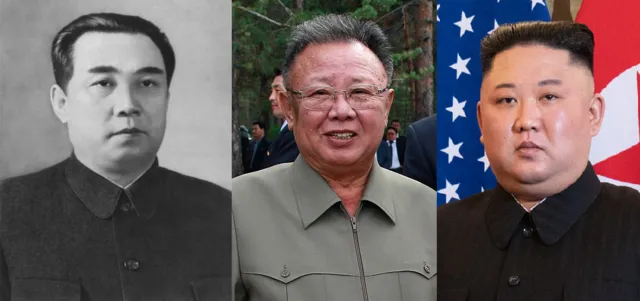North Korea, long led by the Kim Dynasty, is nestled in the Indo-Pacific region. The term "Indo-Pacific" emerged as a geopolitical concept in the early 21st century, blending the Indian Ocean and Pacific Ocean regions into a single strategic area. This shift was driven by the growing economic, security, and political links across Asia, the Indian subcontinent, and the Pacific islands, largely influenced by the rise of China and India as global powers, along with the expanding roles of Japan, the United States, and Australia.
A Brief History of the Korean Peninsula
The authoritarian Kim Dynasty has ruled North Korea since its founding after World War II, following Japan's surrender and the subsequent Allied control of the Korean Peninsula. The region was divided between the Soviets and the U.S. until a unified government could be formed. Kim Il-sung, a Soviet-supported communist, quickly took control of the North and established the Workers’ Party of Korea (WPK). The Democratic People’s Republic of Korea (DPRK) was officially founded in 1948, marking the establishment of North Korea. In response, the Republic of Korea (South Korea) was formed with the support of the United States.
Desiring communist control over the entire peninsula, Kim Il-sung invaded the South in 1950, initiating what is officially known as the Korean War. The conflict ended in 1953, but no formal peace treaty has ever been signed. Since then, the Koreas have faced various issues, particularly instability and unrest in the South; however, South Korea has been a stable democracy since 1987.
North Korea, despite being plagued by decades of poverty, economic hardship, and humanitarian crises has remained relatively stable in terms of leadership. Upon founding North Korea, Kim Il-sung established one-party rule and, more concerningly, an authoritarian dictatorship that has remained a cult-like state under the Kim family. Following Kim Il-sung's death in 1994, he was succeeded by his son, Kim Jong-il (1994-2011). After Jong-il’s death, his son, Kim Jong-un (2011-present), took control.
Christian Persecution in North Korea: Kill them All
Outwardly, North Korea claims to accept and even encourage religion. However, in reality, the hermit nation mandates that its citizens worship its leader, Kim Jong-un. Olivia Enos, a senior fellow at the Hudson Institute, wrote an article for Forbes in May 2024, arguing that life for Christians in North Korea amounts to genocide, stating, “evidence suggests that the persecution of particular groups, especially North Korean Christians, may even amount to genocide” [1] so noted, “At the ten-year mark of the seminal Commission of Inquiry (COI) report on human rights in North Korea, the United Nations is taking a hard look at the country’s human rights record. The 2014 COI report found North Koreans face ongoing crimes against humanity, with human rights conditions unparalleled in the modern world.” [2] “The UN Convention on the Prevention and Punishment of Genocide defines genocide as the “intent to destroy in whole or in part” a group based on nationality, race, ethnicity, or religion.” [3]
To maintain its control over the North Korean people, the regime utilizes the Songbun system. This social classification system categorizes individuals and families based on their perceived political loyalty and background, determining one’s social status, opportunities, access to education and employment, and even food rations. Established by Kim Il-sung in the 1950s, the Songbun system remains a powerful means of social control in North Korea. As noted in a report by Robert Collins, “The North Korean government assigns a ‘songbun’ status to every citizen at birth based on the perceived political loyalty of his or her family going back generations. While a small, politically loyal class in North Korea is entitled to extensive privileges, the vast majority of citizens are relegated to a permanent lower status and discriminated against for reasons they cannot control or change.” [4]
If someone is caught practicing Christianity or even possessing a Bible in North Korea, the punishment is swift and severe. “Deliberate efforts have been undertaken to subject North Korean Christians to bodily harm intended to destroy their group. The regime will stop at almost nothing, in fact, to persecute Christians, including sentencing a two-year-old child and her Christian family to life imprisonment. Rights groups estimate that there are between 200,000 and 400,000 Christians in North Korea, and as many as 70,000 Christians have been imprisoned [often in camps] for their faith.” [5]
So, just how dire is the situation in North Korea? “The COI report exposed the brutal nature of the camps, detailing the regime’s policies of starvation, torture, rape, sexual violence, forced labor, and even death. If a North Korean refugee is found to have attended church or encountered a Christian missionary, they are often sent to these camps or subjected to death in one form or another.” [6] A reasonable argument might be that someone may be better off being a Christian under Taliban rule in Afghanistan than being a Christian in North Korea, although neither scenario sounds appealing.
One might ask: what does Kim think? I know, I’m curious. Only he knows, but it is possible that Kim recognizes the existence of God—he just doesn’t want to compete with Him. In the end, Kim cannot win that battle. While Christians, in their efforts to fulfill the Great Commission, might attempt to smuggle Bibles into North Korea, it may be prudent to reconsider this approach, as it will likely lead to the certain death of the recipients. Perhaps a better strategy is to continue to pray for them. Christians may argue against this, but why? This is significant because Christianity is already present in North Korea, and while the dictatorship can control the people, it cannot control the Christian mind. North Koreans can pray, and that is something Kim cannot control.
[1] Olivia Enos. “Are Christians in North Korea Facing Genocide?” (article, May 17, 2024). https://www.forbes.com/sites/oliviaenos/2024/05/01/are-north-koreas-christians-facing-genocide/ (accessed October 28, 2024).
[2] Ibid.
[3] Ibid.
[4] Collins, Robert. “Marked for Life: Songbun, North Korea’s Social Classification System.” (Report, 2012). The Committee for Human Rights in North Korea. https://www.hrnk.org/wp-content/uploads/pdfs/publications/eng/HRNK_Songbun_Web.pdf (accessed October 28, 2024).
[5] Olivia Enos. “Are Christians in North Korea Facing Genocide?” (article, May 17, 2024). https://www.forbes.com/sites/oliviaenos/2024/05/01/are-north-koreas-christians-facing-genocide/ (accessed October 28, 2024).
[6] Ibid.


